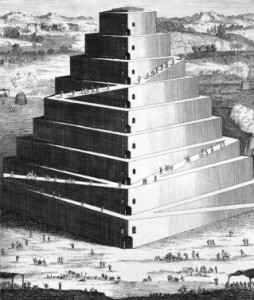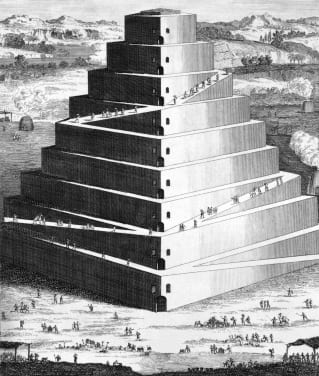 The story of the Tower of Babel is well known: Mankind unites to build an edifice designed to reach the heavens. God descends and frustrates the plan; man is dispersed, and a language barrier, not a tower, is erected.
The story of the Tower of Babel is well known: Mankind unites to build an edifice designed to reach the heavens. God descends and frustrates the plan; man is dispersed, and a language barrier, not a tower, is erected.
The entire earth had one language with uniform words. When [the people] migrated from the east, they found a valley in the land of Shinar, and they settled there. They said to one another, ‘Come, let us mold bricks and fire them.’ They then had bricks to use as stone, and clay for mortar. They said, ‘Come, let us build ourselves a city, and a tower whose top shall reach the sky. Let us make ourselves a name, so that we will not be scattered over the face of the earth. (Bereishit 11:1-3)
The text of the Torah is terse; while we are told that they gather in a valley, and build a city and tower, more words are used to describe the actual construction than any other aspect of the story. The gathering of the raw materials, and turning of earth into bricks and the bricks into a structure, take up the bulk of the text.
We are not told why God deemed it necessary to halt the project, although rabbinic sources reveal that there was something so heinous about their plan that the record of the entire episode was censored and its shocking details suppressed.
In order to unveil the dark heart of this episode that lies behind the terse language of the text, we must first ask a basic, obvious question regarding the scant information we have been given: If the plan was to reach heaven – perhaps to “declare war” on God, as some scholars have suggested– why build in the low terrain of the valley and not on a mountain? If the plan was to prevent the destruction of a future flood, again – why not build on higher ground? Furthermore, building on a mountain would surely have simplified the process and enhanced the results: Quarrying stone would have been far more effective than making bricks. Why, then, gather in a valley and suffer these disadvantageous conditions?
Traditional sources provide us with a small but crucial bit of information. This valley was the lowest area, and it became the drainage route for the waters of the flood. The ecosystem in this particular valley was comprised of the debris from the flood.
The shocking implication of this seemingly insignificant bit of information is that the raw materials from which this new tower was built were the physical remains of the previous generation. The bricks were made from the sediment of the valley – sediment created when an entire generation was eradicated by the flood.
What motivated them to create their tower on these foundations? Here, we must proceed with caution. Apparently, the new generation had developed some type of animosity towards a God whom they perceived as merciless and destructive. Careful consideration of what is not in the text shows that God is not part of their narrative; perhaps this is what some have characterized as a “war against heaven”. Perhaps they saw the tower as a type of memorial for the victims, made out of the very victims it sought to memorialize. Alternatively, their behavior may have been no more than callous disregard. Infatuated with their new technology, history held no interest for this
Echoes of Edengeneration. Stories of the past were of no consequence, and they concerned themselves only with progress and the future.
Other rabbinic traditions take on a new light when considered through the prism of this gruesome episode: Elsewhere, our sages recount that our patriarch Abraham was thrown into the furnace when he expressed belief in one God. The very same furnace used to create these ghoulish bricks was meant to quell Abraham’s voice of dissent. While the text emphasizes the positive trait of unity displayed in the building of the tower, this unity was apparently achieved through brutal enforcement. This society was intolerant of dissenting opinions. Sadly, human history has proven more than once that it is a very short leap between turning one’s back on the past, to (literally or figuratively) misusing the remains of the dead, to killing someone who disagrees with you.
The generation of the tower, unified in trampling upon the remains of the previous generation as well as the rights of dissenters amongst them, was fated to lose the unity which they abused.
As for us, we prefer Abraham – who emerges unscathed from the furnace, committed to decency and kindness. We reject the voice of the mob, the united but tyrannical masses who trampled their fellow man and desecrated the remains of those who came before them in order to build an edifice they believed would bring them honor and glory.
For a more in-depth analysis see: http://arikahn.blogspot.co.il/2013/09/essays-and-audio-parshat-noach.html
The words of this author reflect his/her own opinions and do not necessarily represent the official position of the Orthodox Union.
